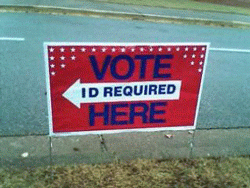Battles over voter photo ID laws come to a head

Facing South readers know the story. After campaigning on jobs and the economy, Republicans in state legislatures in the South and nationally focused on pushing laws that would require voters to show photo ID at the polls.
There's scant evidence that voter impersonation is a real problem, and plenty of evidence that photo ID laws would disenfranchise voters (largely Democrats) and cost cash-strapped states millions of dollars.
But Republicans have been determined, and for good reason: Especially in battleground states like North Carolina and Ohio, anything that could influence who votes -- and who doesn't get to vote -- could help tip the balance.
That's why the American Legislative Exchange Council (ALEC) -- the conservative think tank backed by corporate and Republican-leaning donors that has generated buzz lately -- has helped coordinate GOP efforts to push photo ID laws, including providing model legislation (for example, see this ALEC report [pdf]). Courtney O'Brien, the director of ALEC's elections task force leading the voter ID push, previously served as a Koch Associate at the Charles G. Koch Charitable Foundation .
Republicans also focused on voter photo ID because they thought it was a slam-dunk case, especially after their big 2010 victories. But the campaign has been plagued with obstacles and controversy.
In North Carolina , the newly-GOP-led legislature passed a photo ID law, only to see it vetoed by Democratic governor Beverly Perdue. After Republicans came up short in attempting to override the veto, GOP lawmakers shuffled the bill off to a rules committee and where it could be raised again as a so-called local bill, which only applies to specific counties.
Why? Local bills bypass the governor's desk and can't be vetoed. Whether such an approach would be legal if applied to an issue like state voting procedures is being bitterly debated.
Voter photo ID bills have fared better in other states, especially in the South. This year, Alabama, Kansas, South Carolina, Tennessee, Texas and Wisconsin have all signed ID bills into law.
But even these success stories have come with controversy. After signing a photo ID bill in May, South Carolina Gov. Nikki Haley (R) attempted to allay fears of voter disenfranchisement by promising to personally shuttle those without ID cards to offices where they could get them. As she told a local Fox affiliate :
Find me those people that think that this is invading their rights, and I will go take them to the DMV myself and help them get that picture ID.
Think Progress did a quick calculation of what the governor's ID taxi service might involve. With about 178,000 eligible S.C. voters lacking ID cards, they estimated it would take Gov. Haley more than seven years in driving time to get everyone processed -- "assuming there's no traffic."
South Carolina Democrats seized on the gaffe, tracking down a 76-year-old Army veteran named Robert Tucker, who promptly called Haley's office to ask for a ride to the local DMV. You can guess what comes next -- well you don't have to, because they created a YouTube video:
As Tucker says in the video:
I won't be able to vote because I don't have a picture ID. I called the governor's office and she would not help me get a ride. I'm very disappointed the governor won't help me with what I need to vote.
Questions about the impact of the state laws on the 2012 elections spurred 117 members of Congress last week to send a letter [pdf] to the U.S. Department of Justice. The letter echoes a similar one sent by Senate Democrats earlier this month in calling on DOJ to review the potentially disparate impact of the laws, especially in states covered by the Voting Rights Act:
Restrictive voter photo identification legislation has the potential to block millions of eligible American voters, and thus suppress the right to vote. We urge you to exercise your authority to examine these laws so that voting rights are not jeopardized.
Tags
Chris Kromm
Chris Kromm is executive director of the Institute for Southern Studies and publisher of the Institute's online magazine, Facing South.
